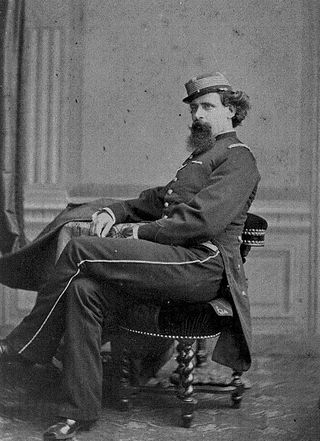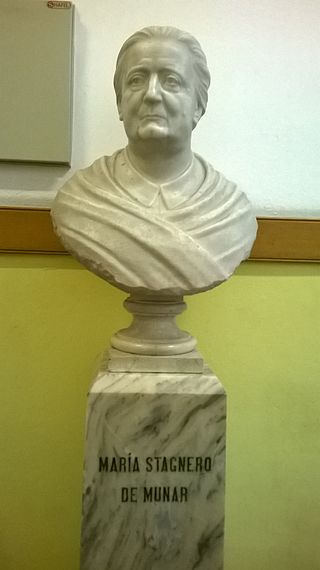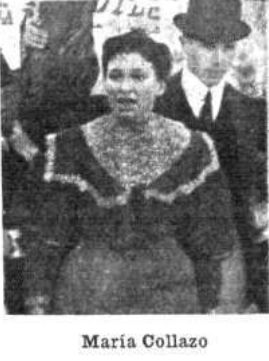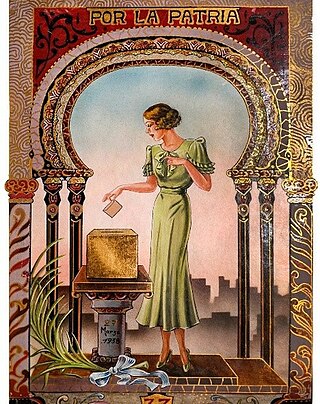
Clotilde Luisi (1882-1969) was the first female lawyer in Uruguay. [1] She was also a professor, pedagogue, translator, feminist activist, and the first Uruguayan woman to study at the Faculty of Law of the University of the Republic.

Clotilde Luisi (1882-1969) was the first female lawyer in Uruguay. [1] She was also a professor, pedagogue, translator, feminist activist, and the first Uruguayan woman to study at the Faculty of Law of the University of the Republic.
Born in Paysandú in 1882, Luisi was the daughter of Angel Luisi Pisano, an Italian emigre, and Josefina Janicki, daughter of Polish exiles in France. She had two sisters, Luisa and Paulina. [2]
Luisi attended the Normal Institute for Girls in Montevideo and completed the qualifications for Normal Teacher of Primary Instruction. In 1900, with a scholarship awarded by the Institute for Deaf-Mute Children of Buenos Aires, she moved to this city to study methods for teaching disabled children. Two years later, having successfully passed her examinations in this subject area, she returned home and entered the University of the Republic. From 1906 to 1911, she studied Law and Social Science and took her Advocate's degree, being the first woman in Uruguay to do so. Subsequently, she was sent to Europe to represent Uruguay at the Conference of Deaf-Mute Teachers held in Rome. On her return home, she was appointed Professor of Moral Philosophy and Religion in the Normal Institute for Girls. Later, after organizing the library of the Law School of the University of the Republic, she was appointed to a professorship in that school. When the Women's University was founded in 1913 in Montevideo, Luisi became the first dean, [3] a position which she occupied until 1919. She wrote on historical and philosophical subjects, and translated several philosophical works into Spanish. [2] She also wrote stories in the "fantastic" vein. [4] Her work was part of the literature event in the art competition at the 1948 Summer Olympics. [5]
Luisi was married to José María Podestá.
She died in Montevideo in 1969.

Paulina Luisi Janicki (1875–1950) was a leader of the feminist movement in Uruguay. In 1909, she became the first Uruguayan woman to earn a medical degree and was a firm advocate of sex education in the schools. She represented Uruguay in international women's conferences and traveled throughout Latin America and Europe. She was also the first Latin American woman to participate in the League of Nations and became one its most influential early activists. Her work has had a lasting effect on women of the Americas.

Paysandú is an Uruguayan city and the capital of Paysandú Department in western Uruguay.

Delmira Agustini was an Uruguayan poet of the early 20th century.

Luce Fabbri was an Italian anarchist writer, publisher and teacher. The daughter of Luigi Fabbri, she wrote for anarchist publications from an early age. After studying literature at university, she fled Fascist Italy and joined her parents in exile, eventually making her way to Uruguay. There she witnessed the rapidly changing conditions of the period, began publishing her own journals and writing her own theories on anarchist revolution. She spent the rest of her life teaching at the University of Montevideo.

Lucía Topolansky Saavedra is a Uruguayan politician and former revolutionary who served as the 17th Vice President of Uruguay from September 2017 to March 2020. A member of the Movement of Popular Participation (MPP) — Broad Front, she also served as Senator of the Republic from 2020 to 2022 and from 2005 to 2017, as National Representative from 2000 to 2005 and as First Lady of Uruguay as the wife of president José Mujica from 2010 to 2015.

Virginia Bolten (1870–1960) was an Argentine journalist and anarchist feminist activist. An anarchist agitator from an early age, she became a leading figure among the working women of Rosario, organising for the Argentine Regional Workers' Federation (FORA) and leading the first women's strike in the country's history. After being recruited into the anarchist movement in Buenos Aires by the Italian anarchist Pietro Gori, she joined some of the country's first anarchist women's organisations and established one of the world's first anarchist feminist periodicals: La Voz de la Mujer.

Lorenzo Latorre, full name Lorenzo Antonio Inocencio Latorre Jampen, was a Uruguayan officer and politician, who was a dictator and President of Uruguay from 10 March 1876 until 15 March 1880. During his rule political opponents were oppressed, but at the same time, his reforms greatly improved the economy and state institutions.

Women in Uruguay are women who were born in, who live in, and are from Uruguay. According to Countries and Their Cultures, there is a "very high proportion" of Uruguayan women participating in the labor force of the South American country. The Uruguayan legislation maintains that the women of Uruguay have equal rights to power, authority, and privileges". In reality, however, women are still not occupying "higher economic, professional, political, social, and religious positions". In relation to the political arena, UN Women reported that a 2012 study made by the Inter-Parliamentary Union (IPU) ranked Uruguay as being "103rd out of 189 countries in terms of representation of women in Parliament". Uruguay low ranking is partly due to its low political participation of women: only 16% of members of Parliament are women as of 2014.
Héctor Luisi was a Uruguayan lawyer, professor, diplomat, and politician. He was the Foreign Minister (1967-1968) and the Ambassador of Uruguay to the United States (1985-1990).
Armonía Liropeya Etchepare Locino was a Uruguayan feminist, pedagogue, novelist and short story writer. She was sometimes referred to as Armonía Etchepare de Henestrosa or, by her pseudonym, Armonía Somer. A member of the literary movement Generación del 45, Somers wrote in a transgressive style. Her contemporaries included Silvina Ocampo, Griselda Gambaro, Luisa Valenzuela, Elena Garro, and Peri Rossi.
This is a short timeline of women lawyers. Much more information on the subject can be found at: List of first women lawyers and judges by nationality.

Frances Benedict Stewart was a Chilean-born American citizen. She was a sociologist, pacifist, feminist, teacher and Bahá′í pioneer. From the late 1920s to 1958, she was the spokesperson for the Baháʼí Faith in the Spanish-speaking Caribbean, northern South America and in Central America. She performed missionary work throughout the region for nearly 40 years and established numerous assemblies for the faith.

Luisa Luisi Janicki, was a Uruguayan poet, teacher, and literary critic.

María Stagnero de Munar (1856–1922) was a liberal Uruguayan teacher and feminist. She was a pioneering player in the reform of the Uruguayan school system in the 1880s, establishing the country's first women's teacher training college, Instituto Normal de Señoritas. In 1916, together with her former students, she formed the National Women's Council of Uruguay.
Francisca Emilia "Fanny" Carrió Sierra was an active Uruguayan liberal feminist.
Isabel Pinto de Vidal was a Uruguayan feminist lawyer and politician, and a member of the Colorado Party. Pinto de Vidal was a founding member of the National Women's Council of Uruguay(Consejo Nacional de Mujeres del Uruguay, CONAMU), a branch of the International Council of Women in Uruguay. Her activism alongside the works of feminists such as Paulina Luisi and Francisca Beretervide is credited for achieving women's rights in Uruguay.

María Collazo was a Uruguayan educator and journalist. She was active in Buenos Aires and she was repatriated to Uruguay in 1907.
Francisca Beretervide was an Uruguayan chemist, educator, author, lawyer, and feminist. She is noted for her role in advancing women's rights in Uruguay. Beretervide's works alongside Paulina Luisi and Isabel Pinto de Vidal paved the way for women's suffrage in her country.
The Uruguayan Women's Suffrage Alliance was a Uruguayan women's suffrage organization. The Alianza was cofounded by Paulina Luisi in August 1919, breaking away from CONAMU to concentrate on pressing for women's suffrage. It was an affiliate of the International Women's Suffrage Alliance (IWSA).

Women's suffrage in Uruguay was practically established between 1917 and 1938. Women's suffrage was announced as a principle in the Constitution of Uruguay of 1917, and declared as law in a decree of 1932. The first national election in which women voted was the 1938 Uruguayan general election.